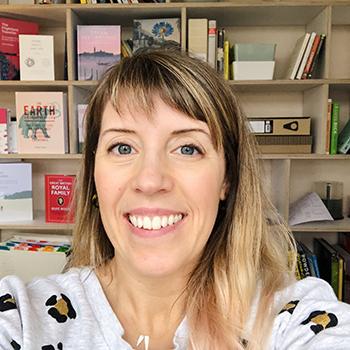Kerry Enzor
Kerry is the publisher of Greenfinch, a non-fiction imprint within Quercus. The internship programme was developed by Kerry along with Emerita Professor Joan Anim-Addo and Dr Deirdre Osborne (co-founders of the Masters) as part of a long-term commitment to tackle under-representation and encourage diversity within publishing.
Primary page content

Can you tell us a bit about the internships – what did India and Lisa work on during their time with you?
They were with us for around five weeks and worked across various departments and editorial imprints – including literary and commercial non-fiction, illustrated non-fiction, literary and commercial fiction, science fiction and fantasy – as well as in the marketing and publicity departments. Tasks were really varied as no two days are the same in publishing! Interns are asked to research new authors, type up review quotes, read and report on manuscripts, write cover copy and check Amazon page listings. They were involved in attending all the key meetings within the company, including the weekly acquisitions meetings where we decide as a company whether to make an offer on a book, or sign off a new idea.
Why are internships like these ones so important?
Internships like this are vital in order to open out publishing career paths to the widest range of talent. Publishing houses have a responsibility to attract, retain and nurture a diverse and representative workforce if they are going to be able to publish books that are relevant and accessible to everyone, everywhere. Hachette, the parent company of Quercus, is committed to positive change and this internship is a very small piece of the wider work that is being done as part of our Changing the Story initiative.
What perspectives/experience do you think India and Lisa brought to Quercus and their internships?
They were an absolute joy – they brought so much enthusiasm and engagement to our day-to-day meetings, and were able to contribute ideas and insights that were really valued by the teams.
Publishing houses have a responsibility to attract, retain and nurture a diverse and representative workforce if they are going to be able to publish books that are relevant and accessible to everyone, everywhere.
Are there any other key objectives of the internships?
I want the interns to enjoy their time with us, build some valuable skills and knowledge, and get a true overview of a commercial publishing house. The ultimate aim is that they are able to use the internship as a springboard to a permanent publishing role – and remember Quercus (and even return one day) during their rise to greatness!
Does studying a degree like MA Black British Literature provide a good stepping stone for a career in publishing?
It certainly gives a rigorous training in critical thinking as well as honing the ability to write and express yourself clearly and persuasively – which are key attributes for most publishing positions. It is definitely worth investigating the varied and interesting roles within non-editorial departments, and commercial as well as more literary imprints.
Will the internship opportunities for MA Black British Literature students be continuing next year and in future years?
We will be welcoming interns from the course each year and hopefully for many years to come. We’re very much looking forward to meeting our next interns in 2022!